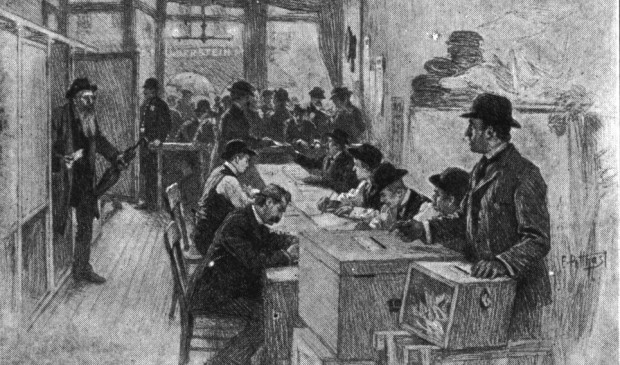House bill could restrict local voter initiatives
Thursday, March 12, 2015 by
Tyler Whitson A voter-led initiative that banned hydraulic fracturing — also known as “fracking” — in Denton last fall appears to have inspired a Texas House bill that could quash similar measures in the future. House State Affairs Committee members heard arguments for and against the legislation at a public hearing Wednesday.
Rep. Phil King (R-Weatherford), who authored HB 540, said it is “somewhat a result” of Denton’s ban, though it wouldn’t repeal existing bans. He added that although it could stop certain initiatives and referenda from going to votes, it wouldn’t prohibit them in general.
The bill would require home rule municipalities to submit to the state attorney general any ordinance enactment or repeal measure that citizens propose through petition before placing it on a ballot. If the attorney general were to determine that the measure would violate federal or state law or cause the government to take private property, the new law would prohibit the vote.
The law wouldn’t apply to ordinances enacted by city governments, such as Austin’s texting-while-driving or plastic bag bans.
Rep. Byron Cook (R-Corsicana), who chairs the committee, appeared skeptical of the bill. “I’m struggling a bit with respect to this going to a politically elected office,” he said. “Can you get a fair ruling understanding that you may be ruling against the people?”
Rep. Sylvester Turner (D-Houston) was the most critical of all committee members. “When people are talking about less government and government being too large, what this sounds like is that the hand of government is getting bigger, and we’re slapping down people on a local level,” he said. “I hear what you’re saying, but there’s something that just doesn’t quite sit well.”
Rep. Helen Giddings (D-Desoto), the committee’s vice chair, seemed puzzled by King’s approach. “Are you shotgunning when you should be rifling?” she asked. “Should you be perhaps considering carving out those particular areas where maybe there might be more logic in my mind for what you’re trying to do?”
Opponents argued primarily that the bill would infringe on local rights and home rule for cities and place too much power in the hands of the attorney general. Supporters argued primarily that it would help create consistency among regulations across the state and minimize the costs of litigation that cities could face after they enact ballot measures.
Home rule cities, according to the Texas Constitution, must have at least 5,000 residents and a voter-adopted charter. They are generally allowed to adopt their own ordinances as long as they are not directly prohibited by state law.
The Texas General Land Office and the Texas Oil and Gas Association both filed suit with the City of Denton just hours after voters approved the fracking ban, arguing that it is unconstitutional. As the Denton Record-Chronicle reported last month, litigation is ongoing.
Despite this, Denton City Attorney Anita Burgess spoke in opposition to the bill. “The initiative is part of the constitutional power of the people. We believe it’s fundamental to our system of democracy, and it’s an ultimate protection of our system of government. Is that convenient? Not always. But we don’t think that democracy is always necessarily convenient,” she said.
“What if the issue is ultimately deemed illegal or improper?” Burgess continued. “We believe that is not for the attorney general to determine. We believe that is for the Texas court system to determine.”
Those behind the Denton referendum said there is concern that fracking could pollute the air and groundwater with toxic chemicals, and might even be the cause of numerous small earthquakes in North Texas and elsewhere in recent years.
Todd Staples, president of the Texas Oil and Gas Association, spoke in favor of the bill. “It provides a necessary path to ensure locally adopted measures do not violate our constitution, a state statute or other state rule,” he said.
“We think that (HB) 540 establishes a procedure where an impartial and knowledgeable party will review the measure,” Staples continued. “It creates checks and balances for how local laws are made when they are petitioned from the public and by the public.”
Mark Miller, who ran as a libertarian candidate for the Texas Railroad Commission last year, said he opposes the bill, even though he did not support the fracking ban. “Interference by the state over local initiatives is no more welcome or beneficial than interference by the federal government over state matters,” he said.
You're a community leader
And we’re honored you look to us for serious, in-depth news. You know a strong community needs local and dedicated watchdog reporting. We’re here for you and that won’t change. Now will you take the powerful next step and support our nonprofit news organization?










